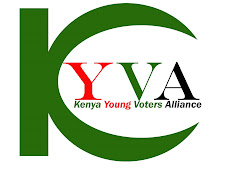KYVA is a conglomerate of organizations and individuals committed to ensuring that Kenya as a country manages to achieve set developmental goals to meet both the international and national targets. The idea was mooted by the (SONU) leadership of 2003/4. KYVA leadership is composed of diverse backgrounds and experiences. We urge all Kenyan youths to take charge of leadership at the counties and national levels. Register as voters and vote in large numbers for young visionary leaders.
Saturday, June 30, 2007
AFRICAN BANKS : A BIG LET DOWN:BY GEORGE NYONGESA
African Banks: A big Letdown!
Imagine what would happen if banks came up with a strategy to have our 800 million people in Africa to make a profit of one dollar a day for self development, after their daily expenditures. Collectively, we would make $ 800, 000, 000 and in a year, make $ 292, 000, 000, 000. Isn't this figure way above the total sum of foreign aid Africa receives?
In his Commonwealth Lecture in 2003, Professor Yunus, Economist and Creator of Grameen Bank contested that our economic theories and frameworks are responsible for perpetuating poverty. As is well known, banks in Africa do not service the development needs of the poor.
African banks focus on the few and rich “large borrowers” but totally ignore the “small borrowers” who are the majority. Even if they reach out to the poor, the business is carried out with a paternalistic attitude. Their cosmetic community activities that are dramatised before media cameras are a public relations tool meant to fool the society.
Consider Kenya as a case in point: while banks are struggling with what to do with a big money reserve, 57 percent of Kenya’s citizens still live in extreme poverty, life expectancy at birth remains at around 48 years and 30 percent of the rural population has no access to safe drinking water.
However, a wave is sweeping across the Kenyan banking industry that perhaps signals a unique opportunity. With large borrowers, such as the government, cutting back on their borrowing, banks are being forced to look elsewhere for business. The panic has pushed banks that traditionally ignored to advertise outside corporate circles to look for small borrowers, commonly referred to as the poor. It is startling that the poor are no longer begging the bank for money but the banks are begging the poor to take its money!
It is sad that as this happens, most people’s mindset is not yet open to credit services. Without education on how to make more with money, are loans not trapping the poor into debts of un-serviced loans? Banks’ corporate social responsibility (CSR) remains a reactive response, treating poor people as liabilities and beneficiaries of public expenditure, in need for things to be done for them.
Africa needs banks that treat poor people as assets and partners in societal development; empowering them to seek solutions to their life challenges and supporting indigenous development. People are a resource and if well harnessed will inevitably be reflected as huge profit returns in their accounts.
This paradoxical situation brings with it unprecedented regional and global opportunities to redefine banking and money in order to effectively serve our people and communities. Despite the credit-phobia amongst poor people, the banks’ paradigm shift is an acknowledgement that poor people can be as creditworthy as the rich. This will restore self confidence in them and precipitate the release of creative energies to improve livelihood. The shift should be followed by educating the poor on how money and banks work. This is essential and crucial for development of our society, especially in the fight against poverty.
If the panic in banking industry in Kenya is anything to go by, banking institutions in Africa must re-package themselves, contextualize their principles, concepts, and framework of business to fight off being outmoded. Africa needs banks that will give the poor a platform to develop capacities to make decisions and implement them, hence reducing their dependence on the elite. Banks should proactively reach out to poor communities to demystify beliefs that banking is a preserve of the elite or rich. The educated poor, with access to credit will easily turnaround their hungry communities into land of plenty.
The growth and success of Bangladesh prototype, Grameen Bank, shows how banking can be turned from its current state of near irrelevance to helping poor people achieve self-sufficiency through entrepreneurship and self-employment. Grameen Bank offers some hopeful hints on the banks crucial involvement in supporting the poor to rebuild their lives.
With the advent of IT development, banks could be part of information diffusion to the community. This would be a definite assault on information poverty and foundation for sustainable development. Some banks could come up with products that nurture the poor people to organize themselves into saving groups so as to improve their financial capacity. This might birth locally owed businesses and first-time savers. We need banks that hold public clinics on ‘how to make money’ alongside their favourite clinics ‘where to store your money’. We need banks that create forums where the poor can listen to “rags to riches” testimonies and even ask questions. We need banks that organize entrepreneurship lectures for school children. With this kind of social vision, banks can empower poor communities to develop their own safety-net-mechanisms.
African banks have answers to some of the poverty and underdevelopment questions. They indeed wield a potent means to move the masses of poor from obsessive struggle for sheer daily survival to larger humanity objectives: the right to liberty, equal opportunity, social justice, peace and spiritual fulfilment.
By George Nyongesa
grnyongesa@yahoo.com
254 720 451 235
Subscribe to:
Post Comments (Atom)

No comments:
Post a Comment